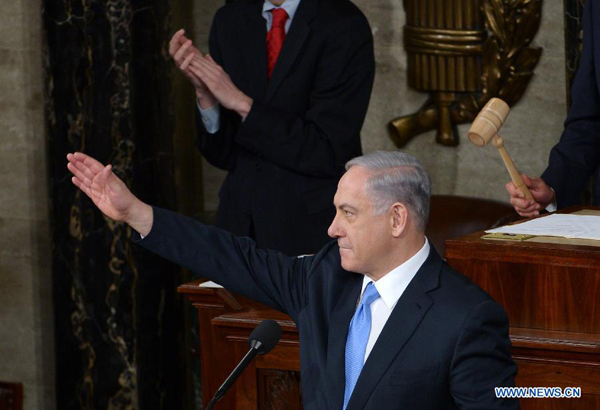Israeli PM calls for rejection of 'bad' nuke deal with Iran
 0 Comment(s)
0 Comment(s) Print
Print E-mail Xinhua, March 4, 2015
E-mail Xinhua, March 4, 2015
Israeli Prime Minister Benjamin Netanyahu on Tuesday called for rejection of what he termed as a " bad" nuclear deal with Iran, insisting such an accord would allow the Islamic republic to develop nuclear bombs.
|
 |
|
Israeli Prime Minister Benjamin Netanyahu addresses a joint meeting of Congress on Capitol Hill in Washington D.C., the United States, March 3, 2015. Netanyahu on Tuesday called for rejection of a bad nuclear deal with Iran, insisting such an accord would allow the Islamic republic to develop nuclear bombs. [Photo/Xinhua] |
"We are better off" without a bad deal with Iran, the hawkish Israeli leader told a joint session of U.S. Congress, in a move that will further strain his often tense relationship with the Obama administration.
He claimed that a final negotiated deal will make "major concessions" to Iran by leaving it with "a vast nuclear infrastructure" and providing it with "a short break-out time to the bomb," as well as by lifting all the restrictions on its nuclear program in about a decade.
"That's why this deal is so bad," he said. "It doesn't block Iran's path to the bomb, it paves Iran's path to the bomb."
As Netanyahu was speaking, U.S. Secretary of State John Kerry was having another round of talks with his Iranian counterpart Mohammad-Javad Zarif in Switzerland, their second within days, as part of the intensifying efforts by the so-called P5+1 group of the United States, Britain, France, Russia, China plus Germany to map out the outlines of a comprehensive deal by the end of March and the final pact at the end of June.
Netanyahu told U.S. lawmakers that under the potential deal, " not a single nuclear facility would be demolished, thousands of centrifuges used to enrich uranium would be left spinning," and " thousands more would be temporarily disconnected, but not destroyed."
"Because Iran's nuclear program would be left largely intact, Iran's break-out time would be very short -- about a year by U.S. assessment, even shorter by Israel's," he said.
Break-out time is the time taken to enrich enough weapons-grade uranium or plutonium for a nuclear weapon.
The Israeli leader has called for dismantling Iran's uranium enrichment program under any deal, a goal the Obama administration terms impossible.
"We cannot let a totally unachievable ideal stand in the way of a good deal," Susan Rice, President Barack Obama's national security adviser, said on Monday at the annual conference of AIPAC, a pro-Israel lobby in the United States.
In his 40-minute speech to U.S. Congress, his third over the years, Netanyahu called a nuclearized Iran "a grave threat" to Israel as well as to "the peace of the entire world."
"A deal that's supposed to prevent nuclear proliferation would instead spark a nuclear arms race in the most dangerous part of the planet," he warned.
He called for a "better deal" that does not leave Iran with "a vast nuclear infrastructure" and "such a short break-out time," and keeps the restrictions in place until "Iran's aggression ends. "
The premier's insistence on addressing a Republican-controlled U.S. Congress, at a crunch time for the nuclear talks with Iran and when Israeli voters will go to the polls in just two weeks, had angered the White House which was kept in the dark when House Speaker John Boehner extended his invitation.
Rice and Kerry were among top Obama aides who had denounced the move, with Rice even describing the speech as "destructive" to the fabric of U.S.-Israeli relations and calling for Congress not to " play the spoiler now."
"I'm less concerned, frankly, with Prime Minister Netanyahu's commentary than I am with Congress taking actions that might undermine the talks before they're complete," Obama said on Monday in an interview with Reuters.
The president had threatened to veto any bill imposing more sanctions amid ongoing talks with Iran, as some lawmakers are mulling such a move.
House Minority Leader Nancy Pelosi described Netanyahu's speech as an "insult" to the United States.
"As one who values the U.S.-Israel relationship, and loves Israel, I was near tears throughout the prime minister's speech -- saddened by the insult to the intelligence of the United States as part of the P5+1 nations, and saddened by the condescension toward our knowledge of the threat posed by Iran and our broader commitment to preventing nuclear proliferation," she said in a statement.
Obama, speaking from his Oval Office after meeting with Defense Secretary Ashton Carter, said he did not watch the premier's speech but read the transcript, as he was having a video conference with leaders of Britain, France, Germany, Italy and the European Council over Ukraine and other security issues.
The president saw "nothing new" in Netanyahu's speech, saying the premier "did not offer any viable alternative."
"We don't yet have a deal," Obama said. "But if we are successful, this will be the best deal possible with Iran to prevent Iran from having a nuclear weapon."
He also stressed that it is "very important not to politicize" the relationship between the U.S. and Israel.
The White House had ruled out an Obama meeting with Netanyahu this time, and more than 50 Democratic lawmakers shunned the premier's speech.
Rep. Peter Welch, a Democrat, claimed that no individual "has done more to harm the vitally important U.S.-Israeli relationship" than Netanyahu.
"The Israeli electorate will decide whether to entrust a man with his temperament and judgement to be custodian of U.S.-Israel relationship," he was quoted as saying by The Hill website.
"I know that my speech has been the subject of much controversy, " Netanyahu said in his opening remarks in U.S. Congress. "I deeply regret that some perceive my being here as political. That was never my intention."






Go to Forum >>0 Comment(s)